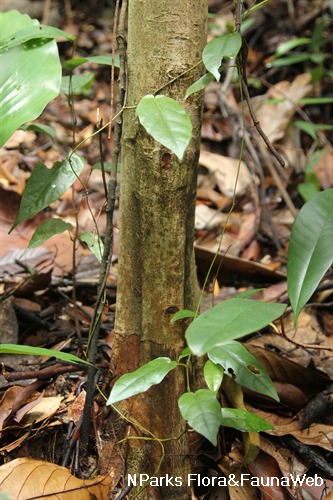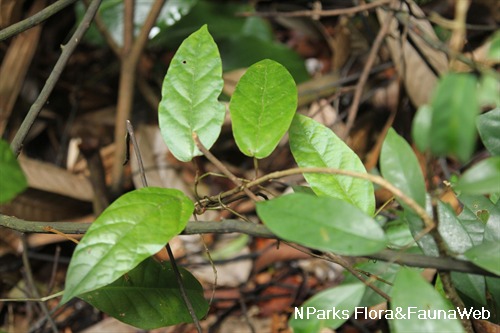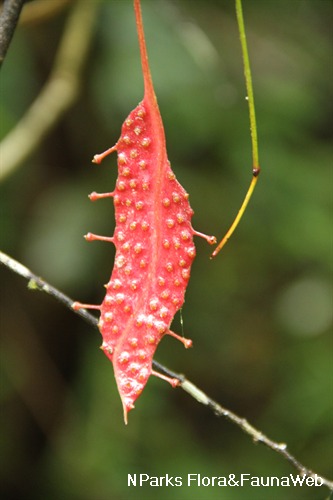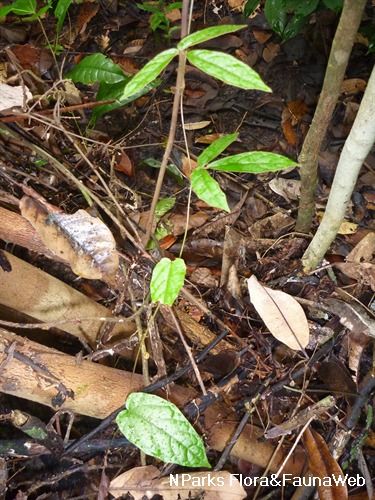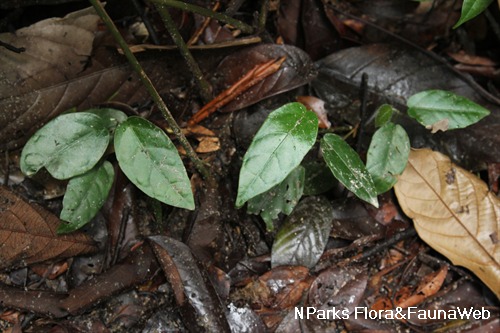
Back
Pterisanthes eriopoda (Miq.) Planch.
| Family Name: | Vitaceae |
| Synonyms: | Pterisanthes baccaiana Planch., Pterisanthes coriacea King var. araneosa, Pterisanthes ovata Korth., Pterisanthes polita Ridl. var. lanceolata, Vitis eriopoda Miq. |
Name
Classifications and Characteristics
| Plant Division | Angiosperms (Flowering Seed Plants) (Dicotyledon) |
|---|---|
| Plant Growth Form | Climber |
| Lifespan (in Singapore) | Perennial |
| Mode of Nutrition | Autotrophic |
Biogeography
| Native Distribution | Peninsular Thailand, Sumatra, Peninsular Malaysia, Singapore, Java, and Borneo |
|---|---|
| Native Habitat | Terrestrial (Primary Rainforest, Freshwater Swamp Forest) |
| Preferred Climate Zone | Tropical |
| Local Conservation Status | Native to Singapore (Critically Endangered (CR)) |
Description and Ethnobotany
| Growth Form | It is an herbaceous climber. |
|---|---|
| Foliage | Its spirally arranged, stalked leaves have papery to leathery leaf blades that are narrow egg-shaped, egg-shaped to oval, 8–14 by 2.5–5 cm, and with toothed margins. They are also covered with hair when young, hairless and shiny above, and densely covered with hair below and on the margin when old. |
| Flowers | Its stalked flowering shoot is 1–56 mm long. |
| Fruit | Its fruits are round berries up to 6–8 mm across. |
| Habitat | It grows on the fringe and in the understory of lowland dipterocarp forests. It occurs locally in Bukit Timah Nature Reserve. |
| Associated Fauna | Its flowers are pollinated by bees, and its fruits and seeds may be eaten and dispersed by birds. |
| Etymology | Greek pteron, wing; Greek anthe, flower, probably referring to the flat blade-like inflorescence; Greek erio, woolly; Latin poda, foot, the reference to which is unknown |
Landscaping Features
| Landscaping | It may be suitable for parks and gardens. |
|---|---|
| Desirable Plant Features | Ornamental Flowers |
| Landscape Uses | General, Parks & Gardens, Small Gardens |
Fauna, Pollination and Dispersal
| Fauna Pollination Dispersal Associated Fauna | Bird-Attracting |
|---|---|
| Pollination Method(s) | Biotic (Fauna) |
| Seed or Spore Dispersal | Biotic (Fauna) |
Plant Care and Propagation
| Light Preference | Semi-Shade |
|---|---|
| Water Preference | Moderate Water |
| Plant Growth Rate | Fast to Moderate |
| Rootzone Tolerance | Moist Soils, Well-Drained Soils |
| Propagation Method | Seed, Stem Cutting |
Foliar
| Foliage Retention | Evergreen |
|---|---|
| Mature Foliage Colour(s) | Green |
| Mature Foliage Texture(s) | Leathery |
| Foliar Type | Simple / Unifoliate |
| Foliar Arrangement Along Stem | Alternate |
| Foliar Attachment to Stem | Petiolate |
| Foliar Shape(s) | Non-Palm Foliage (Oval, Lanceolate, Elliptical) |
| Foliar Venation | Pinnate / Net |
| Foliar Margin | Serrate / Toothed |
| Foliar Apex - Tip | Acuminate |
| Foliar Base | Cordate |
Floral (Angiosperm)
| Flower Colour(s) | Red |
|---|---|
| Flower Grouping | Cluster / Inflorescence |
| Flower Location | Axillary |
Fruit, Seed and Spore
| Fruit Classification | Simple Fruit |
|---|---|
| Fruit Type | Fleshy Fruit , Non-Accessory Fruit |
References
| References | Yeo, C. K., W. F. Ang & A. F. S. L. Lok. 2012. Pterisanthes (Vitaceae) of Singapore: With a Note on the Rediscovery of Pterisanthes cissioides Blume. Nature in Singapore. 5. 185-190 |
|---|
Image Repository
Others
| Master ID | 200 |
|---|---|
| Species ID | 1496 |
| Flora Disclaimer | The information in this website has been compiled from reliable sources, such as reference works on medicinal plants. It is not a substitute for medical advice or treatment and NParks does not purport to provide any medical advice. Readers should always consult his/her physician before using or consuming a plant for medicinal purposes. |

